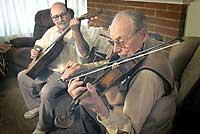Fishing, music and WWII memories unite two longtime amigos

Sixty-three years ago today, the U.S. officially entered World War II after the Japanese air attack on Pearl Harbor. Leverett, 85, and Elizondo, 80, are both veterans of that war, their battle experience the unspoken foundation of a half-century-old relationship.
They served in the Army Air Corps, which would later become the Air Force. But they didn't meet until 1955, as engineers assigned to Boeing's Harbor Island facility. "We had the same outlook on life," Elizondo says. "He had a sense of humor, and he could carry a tune."
Elizondo played the guitar, Leverett the violin; both enjoyed hooking a salmon now and then. And both had dodged their share of bullets: Leverett had flown B-24s out of Italy, receiving a Purple Heart for his service. Elizondo staffed B-24s as a top turret gunner and radioman, mostly out of Saipan, earning the Distinguished Flying Cross.
After a long day chasing fish, they'd sit by the fire, not having to talk. That's why a Missouri boy and a Texas-born son of Mexican immigrants get along so well. "We connect that way," Elizondo says, in a voice as slow and creaky as a porch swing. "No matter how big a vocabulary you have, you can't express it to other people. Actually, it's more of an emotion than a communication."
THEY TOLD ELIZONDO he'd have to fly 30 missions. Then 40. Sometimes nothing happened. Other times, it was hell in the sky — antiaircraft fire whizzing all around, your hands and feet dancing on the controls and your mind racing, oh my Lord, not this time, not this time.
Hope became baggage you just cut loose. It was a useless thing to carry around. You wrote home and said everything was OK, but fate would have its way. Ten months went on forever.
On one of Leverett's missions, shrapnel ricocheted off his flak jacket and tore open his leg. He used a glove to plug the hole. It was so cold the bleeding just stopped, and when he landed, the plane had a flat tire. He blew out the other one trying to stay on the runway.
That's how he got his Purple Heart. "It's just important that we survived," he says.
Adds Elizondo: "My mom, all she did was pray."
Says his wife, Hazel, from the kitchen: "It worked."
AS FISHING DAYS have given way to fishing stories in the past 20 years, Elizondo and Leverett have made a ritual of taco lunches at Viva Mexico, near Elizondo's house in White Center. Sometimes, by the time the two old friends have pulled the car up and made their way inside, the beers are already on the table.
Afterward, it's back to Elizondo's place to make music.
"We sound much better after a couple of Coronas," Leverett says.
Today, they try a bit before lunch. Elizondo grabs his guitar while Leverett cushions his fiddle against his wrinkled neck. Finally tuned up, they launch into "Memories," from the musical "Cats."
"That turned out all right," Elizondo says when it's done. They do a few more, hitting too few highs for their taste. Elizondo unleashes a pair of Mexican tunes from his childhood as Leverett tries to convince his fiddle he's not a stranger.
"Are we playing the same thing?" Leverett asks. "I know what the trouble is, no Corona."
In a closet down the hallway, Elizondo's military jacket gathers dust, his ragged release orders in a pocket. His medals are in boxes. But check out that sailfish, amigo, the one he caught off Puerto Vallarta: It shimmers from a wall like a giant, sea-blue marquee.
FISHING teaches you patience, and 60 years after the events of August 1944, retired Air Force Lt. Col. Virgil Leverett submitted paperwork for a second Purple Heart.
That day, Leverett piloted what should have been an easy run, but German planes strafed his plane.
Three crew members were dead. Leverett gave the bailout signal, but when his turn came, flames blocked the exit. The plane broke apart, and he spilled into Czechoslovakian airspace.
He pulled the ripcord. Nothing. Another yank. Nothing. Finally, out popped the chute. "I've never seen a more beautiful sight than that white canopy against a bright, blue sky," he says.
He was a POW for nine months.
At first, his application was denied; he had no proof of wounds he says had healed by the time he left the POW camp. But new eyewitness accounts and documents brought a new verdict. Last month, Leverett was presented with another Purple Heart, with one oak leaf cluster, at Washington's McChord Air Force Base.
For whatever reason, fate gave him and Elizondo tickets home.
Says Leverett: "We were saved for better things."
Adds Elizondo: "Like steelhead."
Marc Ramirez: 206-464-8102 or mramirez@seattletimes.com